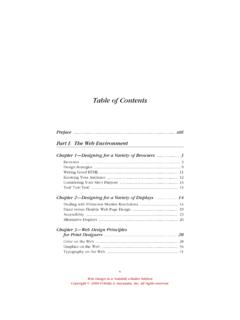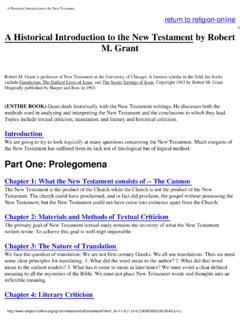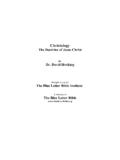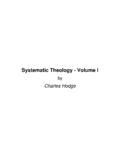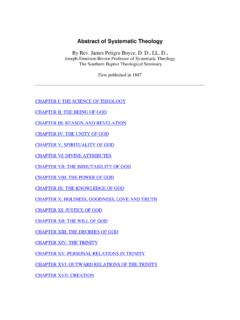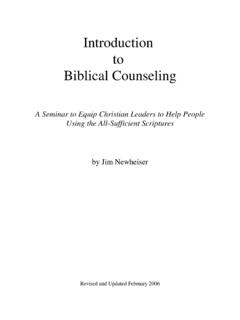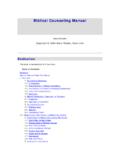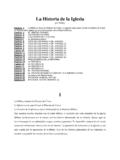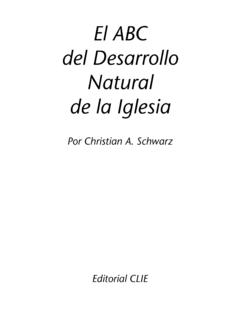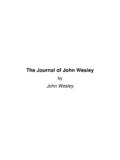Transcription of Exegetical Fallacies - The NTSLibrary
1 Exegetical Fallacies Common mistakes Every Student of the Bible Must avoid William D. Barrick Professor of Old Testament, The Master s Seminary Introduction Over twenty years ago, D. A. Carson published his superb volume entitled Exegetical Fallacies (Baker, 1984). In it he covers the areas of word-study Fallacies , grammatical Fallacies , logical Fallacies , and presuppositional and historical Fallacies . Personally, I think it should be required reading for every seminary student without exception. Since Carson did such a wonderful job of covering the issues, what areas should I cover in this seminar? Repetition is instructive, but it can also be boring, unless there are some new twists to the presentation. Therefore, it is my aim to focus on the subtitle for this session: Common mistakes Every Student of the Bible Must avoid . Forty-two years of preaching, thirty-eight years of teaching, and over twenty years of Bible translation ministries provide an abundance of personal examples.
2 Lest this session become a litany of mea culpas, however, I will not reveal how many of the following mistakes have been my own at one time or another. The Evidential Fallacy In the evidential system of American and British jurisprudence the concept of prima facie (literally, at first view ) evidence is very important. Prima facie evidence is evidence that is sufficient to raise a presumption of fact or to establish the fact in question, unless evidence of equal veracity is presented in rebuttal. Included in this evidential system is the presumption of innocence until proven guilty and that witnesses must present facts, not opinions. In the area of biblical studies this evidential methodology stands in opposition to the hermeneutics of doubt (or, the Troelschian principle of skeptical criticism).1 As Robert Dick Wilson observed, our text of the Old Testament is presumptively correct.
3 Its meaning is on the whole clear and trustworthy. 2 Whether we are discussing the Old Testament s historical narratives or the Gospel narratives, evangelicals should approach the biblical text with a presumption of factuality. One of the greatest Fallacies students of Scripture can commit is to fail to adequately recognize the prima facie nature of biblical evidence. It is fallacious to condition acceptance of the biblical text upon corroboration by external evidence. When the student comes upon interpretive problems in the biblical text, he must allow the text to speak and must accept the testimony of the text with a presumption of accuracy. Therefore, reading about the Chaldeans in Genesis 11:28-31, for example, should not cause us to doubt the veracity of the text because the extrabiblical Assyrian records do not mention Chaldeans until the 9th century The Assyrian evidence is not contemporary with Moses (the author of Genesis 11) nor with Babel (the historical setting of Genesis 11).
4 Acceptance of the Assyrian evidence over the biblical evidence denigrates the biblical record and treats it with skepticism rather than as prima facie evidence. As Kenneth Kitchen points out, inconsistency dominates the appeal to Assyrian historical texts, since 1 See V. Philips Long, Historiography of the Old Testament, in The Face of Old Testament Studies: A Survey of Contemporary Approaches, ed. by David W. Baker and Bill T. Arnold (Grand Rapids, MI: Baker Books, 1999), 154, 169. 2 Robert Dick Wilson, A Scientific Investigation of the Old Testament, rev. by Edward J. Young (Chicago: Moody Press, 1959), 9. Exegetical Fallacies Barrick Shepherd s Conference 2006 2the Egyptian pharaohs of the period from the patriarchs to Moses also do not appear anywhere in the Assyrian In other words, we err when we automatically assume that every major interpretive problem is due to an inaccuracy within the text itself.
5 As we deal with problems in the biblical text, we must assume that it is accurate until proven otherwise by equally accurate, equally authentic, and equally ancient evidence. For example, when we read in the superscription to Psalm 60 that Joab slew 12,000 Edomites, we ought to accept that as prima facie evidence. Of equal standing are the records in 2 Samuel 8:13 and 1 Chronicles 18:12. The former reveals that David slew 18,000 Arameans; the latter declares that Abishai slew 18,000 Edomites. Are these three contradictory accounts, or three complementary accounts? Perhaps the differences in the individuals involved reflect the chain of command. David, as king, was commander-in-chief. Joab, being next in command as the chief of the armies, was the field commander and Abishai, a subordinate officer to Joab, was over one contingent of the field army participating in this particular action.
6 Variation in the numbers of enemy casualties might reflect different methods of calculating the casualties at separate levels of the chain of command or different times for certain counts prior to a settled statistic. Possibly, the different casualty counts indicate different engagements within the greater battle or even a series of battles. As for the difference between Edom and Aram, we should keep in mind that both Edomites and Arameans participated in the campaign against David s forces (see 2 Sam 8:5; cp. 1 Kgs 11:17 [the Aramean Hadad with Edomites]). The target area was Edom, but Arameans were present and had also created a diversion in Aramea (Syria) where David had gone to quell the uprising. Another example from the OT might help illustrate the difference between what current archaeologists and historians are saying about the text as compared to a proper understanding of the text itself.
7 Consider the exodus from Egypt. Grant Osborne mentions the lack of primary physical evidence for the He then observes that there is a fair amount of secondary evidence for such a migration and sufficient data to accept the historicity of the events. 5 That kind of thinking is antithetical to the concept of a priori evidence and demeans the authority and accuracy of Scripture. The Scripture is itself sufficient evidence to accept the historicity of the events. We ought not to wait for sufficient data to accept any declaration of Scripture. The Superior Knowledge Fallacy Exegetical problems most often arise due to our own ignorance rather than any fault in the text itself. It has become customary among evangelical scholars to resort to textual emendation in order to explain some difficult texts. For example, Alfred Hoerth resorts to scribal glosses for the mention of Chaldeans in Genesis 11:286 and a later editorial touch in his treatment of the phrase in the land of Rameses in Genesis 47 His preference for later textual revision as an explanation makes his accusation against critical scholars ( To accept the biblical account is now said to be na ve 8) ring hollow.
8 It also contradicts his own principle that it 3 If Assyrian mentions are the sine qua non (the absolute criterion) for a king s existence, then Egypt and her kings could not have existed before the specific naming of (U)shilkanni, Shapataka, and Ta(ha)rqa in 716-679! (K. A. Kitchen, On the Reliability of the Old Testament [Grand Rapids, Mich.: William B. Eerdmans Publishing Co., 2003], 12). 4 Grant R. Osborne, Historical Narrative and Truth in the Bible, Journal of the Evangelical Theological Society 48/4 (Dec 2005): 685. 5 Ibid.; emphasis mine. 6 Alfred J. Hoerth, Archaeology and the Old Testament (Grand Rapids, Mich.: Baker Books, 1998), 59. 7 Ibid., 156 n. 14, 166 n. 1. 8 Ibid., 215. Exegetical Fallacies Barrick Shepherd s Conference 2006 3is not a sound practice to emend the biblical text to make the identification fit.
9 9 Scholars too often pursue many such textual emendations merely because the interpreter has insufficient knowledge to make sense of the text as it stands. Ignorance should never be an excuse to emend the text in order to make it understandable to the modern western mind. Above all else, the evangelical exegete/expositor must accept the biblical text as the inerrant and authoritative Word of God. Adhering consistently to this declaration of faith will require an equal admission of one s own ignorance and inability to resolve every problem. Our ignorance, however, should never become the excuse for compromising the integrity of the Scriptures. Our first assumption should be that we are in error, rather than applying the hermeneutics of doubt to the text. According to Francis Andersen, The notorious difficulties of the book of Job have been largely blamed on a corrupt text; but it is more likely, in my opinion, that much of the incoherence is due to the artistic representation of the turbulent outbursts and hysterical cries of rage and grief.
10 10 Due to his work with David Noel Freedman for the Micah volume in the Anchor Bible series, they decided that the unusual and sometimes crazy character of the text was exactly that. It is an effective rendition of the sobs and screams of a person who has lost all self-control in paroxysms of rage and grief. 11 In other words, the classical Hebrew authors of both Job and Micah really did know the language better than modern Hebraists. The Word Study Fallacy Word studies are popular, easily obtained from available resources, and an easy way to procure sermon content. However, word studies are also subject to radical extrapolations and erroneous It is not always possible to strike Exegetical gold by extracting a word from the text for close examination. Word studies alone will not suffice. Indeed, over-occupation with word studies is a sign of laziness and ignorance involved in much of what passes for biblical exposition in our times.
